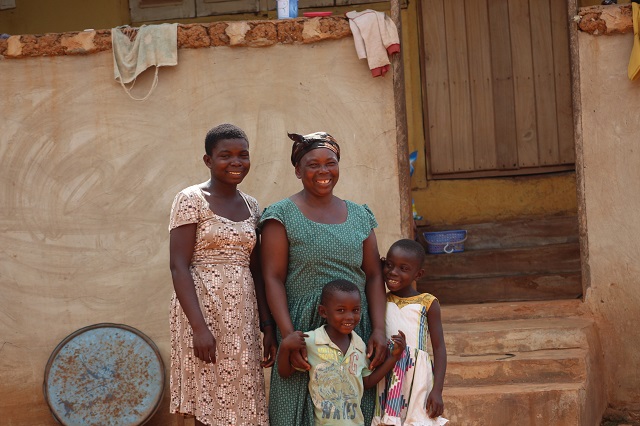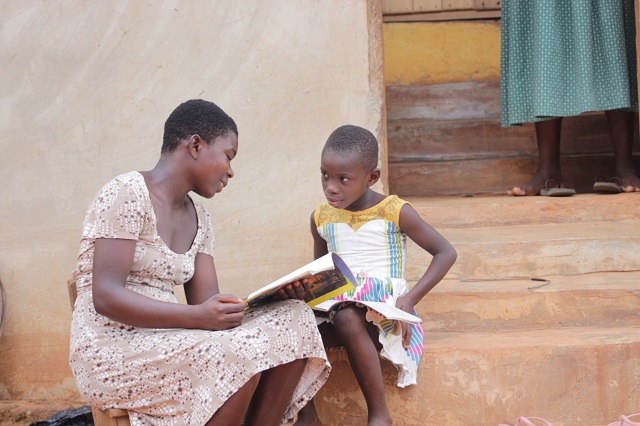Freedom to Focus on the Future

Abena* feels fortunate to be off the streets and back in school again.
Without the worry of her family’s well-being on her mind, Abena, 17, can now concentrate on her studies to fulfil her dream to be a nurse.
For almost a year, Abena woke up early in the morning not to go to school, but to hawk roasted tiger nuts on the streets of Ejisu, a small town in south-central Ghana. There was nothing for breakfast, the little meal the night before would be her source of her strength for the workday.
Wearing her worn out brown sandals, Abena roamed the streets all day. Working on the busy roads exposed her to many dangers, but the daily reality of hunger at home kept her returning day after day. “I saw people mugged and beaten on the streets,” Abena recalls. “I had to be brave to sell. I was frustrated, dusty and exhausted. Seeing my little brother and sister eat a small meal at the end of the day made the risk worth it.” A good part of the money Abena earned went to replenish her stock, and the rest she used to buy food.
Helena, Abena’s mother, could not work. She was ill with grief after the father of her three children left her. When Helena was in good health, she made a living from menial jobs and subsisted on her little farm. The income was barely enough to cover the family’s basic needs. Her children skipped school regularly due to hunger and lack of school uniforms.
“Life at home was hard before my mother fell sick, but it became unbearable after her illness,” explains Abena. “There was no food and no money to buy anything. We depended on my grandmother for food or our neighbours for a while, then my mother pleaded with me to work because she could not. I knew leaving school to work would affect me for the rest of my life, but someone had to take care of my mother, younger brother and sister. It was a tough decision for me to make.”
“The burden of not knowing how to feed my children, or how to send them to school was very heavy on me,” says Helena. “Worst of all I did not know where else to turn. It is a bad place to be when you have children looking up to you. They were helpless and so was I.”

Family support
Helena needed help to give her children a safe and nurturing home. A member of a local council of churches recommended the family to the SOS Children’s Villages family strengthening program. The SOS team works to address problems vulnerable families, like Helena’s, face to prevent children from losing parental care.
In 2019, Helena received a grant to start rearing pigs. She bought a pregnant sow, which farrowed multiple piglets. Selling the piglets to other farmers earned her enough to provide for her children.
The SOS team equipped her with the knowledge and skills to succeed in raising animals farming. Helena also trained in childcare, parenting and children’s rights to help her be a better parent. Financial and business management education came from a local Village Savings and Loans Association (VSLA) that she joined. Members in the group save money to qualify for a loan they can use to expand their business or meet other demands at home.
With this support, Abena stopped selling nuts and returned to school, ready with a school uniform, textbooks, exercise books, school bag and shoes. Her seven-year-old sister started going to school for the first time, but her baby brother stayed at home, as he was still too young.
When the COVID-19 crisis hit Ghana in March 2020, causing all schools to close, Abena went to study in one of the centres set-up by the SOS team, for children without access to radio, television or internet at home.

Abena, now in her second year of junior high school, returned to physical class in October. “My future is all I am thinking about right now,” says Abena with conviction. “I am no longer tied down by worry and work; I am free and my heart sings with joy.”
Helena says she no longer feels isolated as she did before. “I am pleased that our quality of life has improved and my dignity as a mother has returned,” says Helena as she feeds her 12 pigs. “Family means a lot to me; without my family and my children, I do not really have any meaning in my life.”
“Life was very difficult for me after my husband abandoned us. I felt shamed. People laughed at me and that made me feel very hopeless. I became very sick that I could not work to feed my own children. Today, I have many pigs and my maize farm is doing well. This is great progress. We are very happy and comfortable, and my children have hope that they too can be great in future.”
*Name changed for privacy reasons.
SOS Children's Villages Ghana COVID-19 Response
- At the height of the coronavirus pandemic in 2020, SOS family strengthening initiated a solidarity fund that saw all 268 families in the program, including the vulnerable households in the community receive assorted food items such as rice, maize, chocolate powder, sugar, ‘garri’ and tomato puree, among many other items to cushion them from the effects of COVID-19.
- In addition, mobile money was transferred to 50 caregivers in need to enable them buy more food supplies for their families, while 49 caregivers received more grants to boost their businesses weakened by the COVID-19 pandemic.
- COVID-19 awareness activities through posters, radio engagements and community outreach were carried out.
- Through the solidarity fund, 1,374 children and 318 caregivers received facemasks, and 370 bottles of sanitizers were distributed.
- Fifteen families benefitted from e-learning tools to enable children access to teaching and learning online. With primary schools still closed in Ghana due to the pandemic, 900 children are currently benefiting from eight centers set up for homeschooling in five different communities.
Canadians wishing to help vulnerable children are encouraged to Sponsor a Child, Sponsor a Village or make a Donation today to our COVID-19 response.
